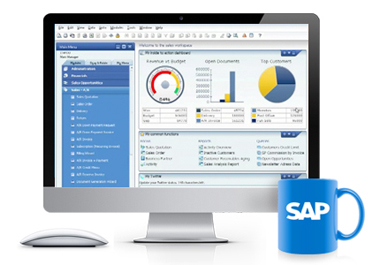Enterprise Leaders Succeed in Business By Implementing ERP Systems
 You’ve probably already heard how countless small and mid-sized businesses (SMBs) optimize operations, maximize efficiency, and save money simply by implementing ERP systems. Enterprise resource planning (ERP) software provides business owners with essential applications for advanced enterprise information management and administration. Those applications include accounting and customer relationship management (CRM) software, inventory tracking and control systems, and high-performance business analytics tools. When all of these vital ERP programs and capabilities are integrated on a single digital platform, a growing business can streamline and accelerate processes while minimizing costs and boosting profits.
You’ve probably already heard how countless small and mid-sized businesses (SMBs) optimize operations, maximize efficiency, and save money simply by implementing ERP systems. Enterprise resource planning (ERP) software provides business owners with essential applications for advanced enterprise information management and administration. Those applications include accounting and customer relationship management (CRM) software, inventory tracking and control systems, and high-performance business analytics tools. When all of these vital ERP programs and capabilities are integrated on a single digital platform, a growing business can streamline and accelerate processes while minimizing costs and boosting profits.
Implementing ERP systems and software provides plenty of unbeatable benefits to wholesale distributors, retailers, and manufacturers. However, the implementation process can seem rather daunting to the average business owner. That’s why industry leaders turn to highly-experienced ERP consultants and value-added resellers (VARs) to help configure and install the best integrated business software available.
What is ERP Implementation?
When a business owner is ready to upgrade to a better ERP solution, they might think all they have to do is install the right program and figure out how to use it on their own. Implementing ERP systems actually takes a lot more effort than that.
The first step in the ERP implementation process is to identify the areas of business that need new software. Hopefully that’s only a couple departments, but there’s no need to worry if the entire organization needs a software overhaul. Top-rated ERP solutions such as SAP Business One can be customized and configured to suit the needs of an enterprise, no matter how big those needs are.
After configuring the software, the next step is to install it on your company’s network. However, installing an ERP system is generally a lot more complicated than just downloading a program. Because ERP systems are so powerful, they must run equally powerful computers and servers. You have to be sure that your existing machines can handle upgraded software before implementing ERP systems. If you discover that your computer network could use some upgrading as well, ERP consultants can aid in that area too.
The final step in the implementation process is to learn how to use the new ERP software. Employee training is a necessary part of upgrading software, as even the simplest ERP solution can take a long time to master. Your employees would greatly appreciate all the education and support they can get before utilizing the ERP software full time. To successfully prepare your business for new software systems, it is highly recommended that you partner with a dedicated software consulting company before implementing ERP systems on your own.
Cornerstone Consulting Provides Top-Notch ERP Implementation Services
In Florida, midsize distributors know that they can rely on Cornerstone Consulting for all of their ERP implementation needs. We are an information technology (IT) consulting firm based in Tampa, and we provide the highest quality ERP software and support services to growing businesses all over the country. Cornerstone is an award-winning VAR of SAP Business One, as well as an award-winning SAP Gold Partner. Our talented consultants and developers have been successfully implementing ERP systems for over a decade. We are passionate about helping mid-sized wholesale distributors, manufacturers, and retailers optimize performance and maximize efficiency and profitability through the right integrated ERP solution.
Ready for unparalleled ERP advice and support? Call Cornerstone today to learn more about how we can help your business grow. We will be happy to take your call and answer any question you might have about this world class wholesale distribution software solution.


